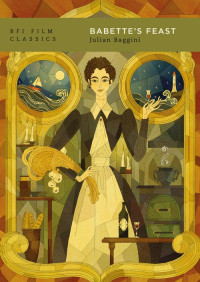


The first thing we see in Babette’s Feast is a meal. But it is not the repast of the title, rather a charity lunch prepared by two sisters in an isolated town on Jutland comprising a harsh Lutheran sect. The sisters are old maids, but interestingly they have a French maid, Babette, who is a refugee from the Paris Commune. As in Isak Dinesen’s source story, the maid, played by Stephane Audran, comes into some unexpected money and serves the reserved, devout, self-denying residents a sumptuous meal, revealing subtly that back in Paris she was a four-star chef. Directed and written by Gabriel Axel, the film is now the subject of the latest British Film Institute Film Classics monograph, written by philosopher James Beggini.
The book is divided into five topics, “Mortal Illusions,” “Love,””Pleasure, “The Artist,” and “Grace,” and though like most BFI books, it carries you through the film, it is also delineating a series of philosophical questions. The theme of the book is to reconcile the theology behind the Lutheran sect’s austerity with the be-here-now elements of the Gospels, as well as certain Eastern religions, and perhaps the whole is summarized with this paragraph on page 78: “Babette’s Feast is the most eloquent and insightful examination and explication of this kind of immanent religiosity I have ever come across. It is a religiosity based on humility, reverence, mystery and submission in the face of the natural world, more than the supernatural one. It is a curious kind of religiosity, however, in that it speaks as much to atheists and agnostics as it does to traditional believers, perhaps even more so. It is a challenge to atheists who think that, having dispensed with belief in God, there is nothing left in religion worthy of their attention.”
This is a sensitive searching account of the film, which attempts to have Babette’s Feast qualify as “film as philosophy,” a difficult concept for the average reader, probably. But the author also attends to the surface of the film. He notes that Gabriel Axel softens Babette from the at times rather harsh and arrogant person in Dinesen’s story.
Fortunately there is a Criterion disc of this 1987 movie, No. 665, with in addition to the film, a New 2K digital film restoration with newly translated subtitles, new interviews with Axel and Audran, a documentary about Dinesen from 1995, a “visual essay” by filmmaker Michael Almereyda, an interview with sociologist Priscilla Parkhurst Ferguson about “the significance of cuisine in French culture,”the film’s trailer, and a booklet featuring both the original short story from 1950, and an essay by Mark Le Fanu, one of the best contemporary writers on film.
Mr. Beggini describes the essential virtues of religion with such grace, clarity, and nuance that it’s almost enough to make me a believer – but not quite. Last week I discussed Rosemary’s Baby, whose key dialogue between the Castenets and Guy and Rosemary is about the theatricality of “organized religion,” of which the spare austere Lutheran sect is a repudiation, of “papism,” if nothing else. Yet, apparently, this is one of Pope Francis’s favorite film. As a pre-laped-sarian Catholic, I have no temptation to succumb to atavistic religions. Yet one can admire the stated intention of the religion without falling for its gowns and incense. This is a beautiful film that rewards re-viewing, and – unusually for the series – Mr. Beggini’s volume demands some patient from the reader. But the reader will be rewarded with ample food for thought.


